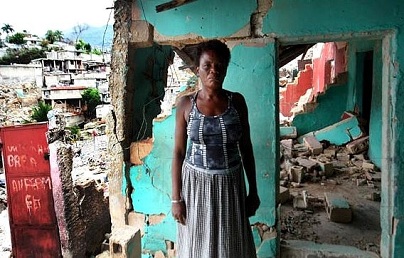Life in Devastated Haiti

Cleante Calixe, 45 years old, and her 3 year old daughter survived the earth-
quake that devastated Haiti on January 12th but they lost their house in
Kafoufey when it collapsed. (minustah.org) (flickr)
Haiti remains in emergency. For growing numbers, aid is "too little, too late." It presents an enormous challenge for those who care, to "do better, in order to support the possibility of hope, the possibility of recovery, and the opportunity to build back better."
"They're pitted against an indifferent government, woefully little aid, and conditions unacceptable for anyone, including inadequate food, poor sanitation, little safe drinking water, weather-beaten makeshift shelters, too little of everything needed, no resolution of their homelessness, and the world community turning a blind eye to their plight."
Nine months after the January 12 earthquake, Haitians still have little relief. Over one and a half million left homeless continue struggling to survive, despite billions in aid raised or pledged. It's for development, predatory NGOs, not them. That's the problem, and they suffering as a result, little media attention paid to their plight.
On September 15, Los Angeles Times writer Joe Mozingo headlined, "No plan in sight for Haiti's homeless," saying:
Where to put them is contentious, reconstruction "hang(ing) on the potentially explosive issue" of who owns the land. For example, pre-quake, tenant farmers used to plant corn and sugar cane on a wealthy family's 20-acre parcel "below the city's main transmission lines of the Delmas 33 road."
"Now an estimated 25,000 people call it home," living in one of many temporary camps, poorly protected against heavy rain, severe weather or hurricanes. When security men try to evict them, they're chased off with "rocks, sticks and machetes."
"It's not like we're comfortable here," says Katlyne Camean. "Last night when it rained, I filled three buckets of water from my house. But no one is telling us where they want us to go. I don't want to go somewhere worse."



























